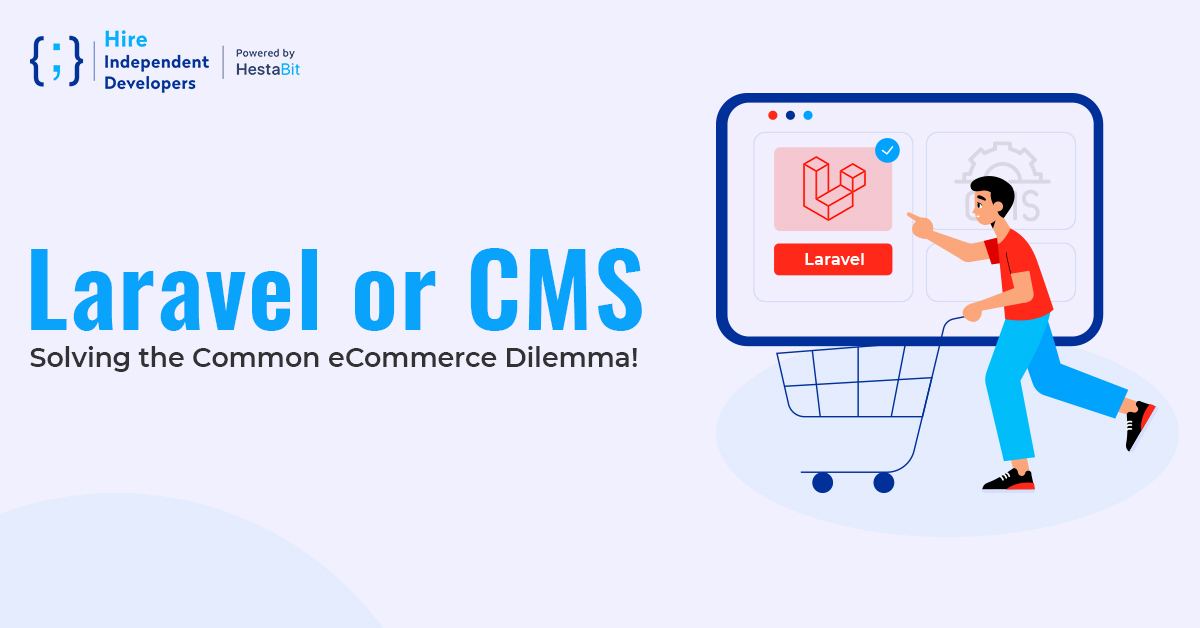The future of eCommerce belongs to those who believe in offering the best user experience to their consumers. In order to do so, you would want your website, application, or network to be secured and appealing to your customers.
There you go in a dilemma again. The most usual question arises here.
What language or framework should be used to develop your ideal eCommerce store?
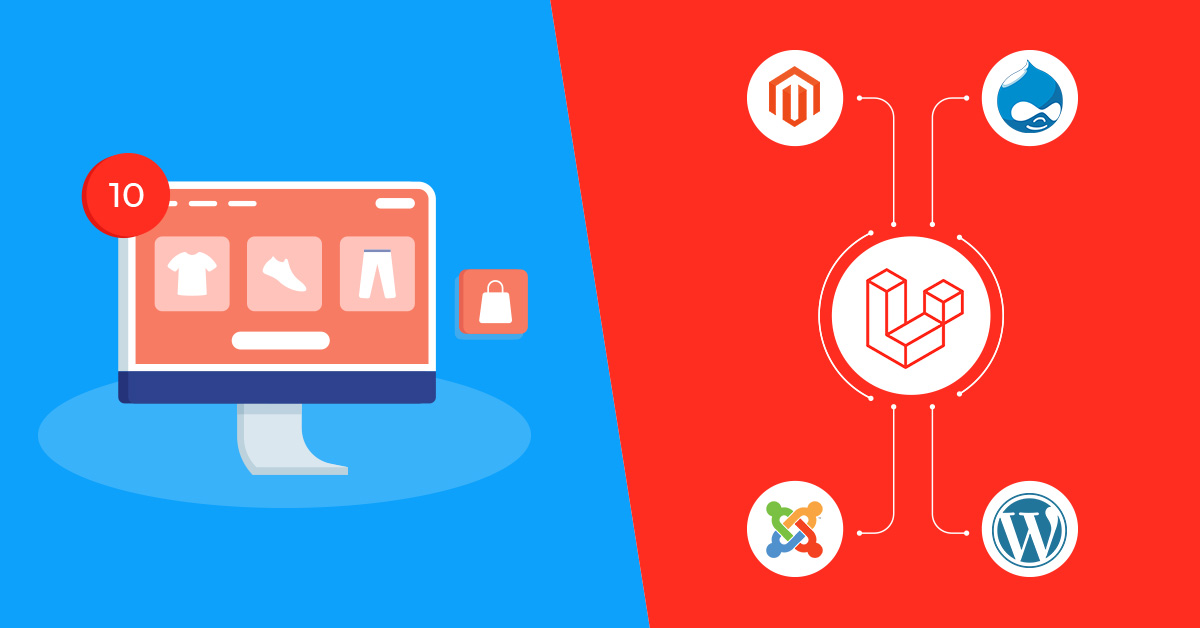
It can be challenging since there are numerous options available with considerable benefits. To simplify the development process, many enterprises draw towards the CMS (Content management system) platform. However, for long-term growth, it is essential you consider every small factor impacting your business.
Creating marketplaces or online stores with Laravel eCommerce presents you with everlasting benefits. You get scalability, excellent performance optimization, clean code structuring, along with several other features. To choose what’s best for your online store, let’s weigh in the benefits of both ready-made CMS and Laravel packages.
This article revolves around many other questions that arise with your eCommerce development.
In this article, we will talk about:
- What makes enterprises choose Ready-made CMS over Laravel?
- Why do you need Laravel packages for your online store in 2021?
- Most beneficial Laravel eCommerce packages for your store?
- Limitations of CMS software solutions.
- Final Analysis.
CMS platforms are undoubtedly a reliable solution to businesses with a web presence. Many enterprises often utilize ready-made CMSs such as WordPress, PyroCMS, Drupal, etc., for their online stores. Further, they spend piles of money on website customization along with wasting a hefty amount of time and effort.
Now isn’t it better to rely on a completely optimized Laravel PHP framework rather than a CMS that needs expertise?
Let us understand other possibilities before we come to a decision.
What makes enterprises choose Ready-made CMS?
This is a widespread perception among organizations that CMS platforms such as WordPress and Drupal result in better eCommerce websites and applications. They count a certain number of factors for this. Let’s have a look.
Seamless content management:
Whether you own a simple online clothing store or complex AI-driven eCommerce platform, using an advanced CMS eases up your managerial tasks and content on your website. Functions like blog posts, adding products, editing SEO data, and altering content can be performed without any assistance. This is why store owners usually go with ready-made CMS so that they can emphasize on their business rather than web management.
Availability of plugins and themes:
Some of the most popular PHP CMSs, such as Drupal, WordPress, and Magento, consist of thousands of (free/paid) themes and plug-play extensions. Using these
Options not only save time but developmental jobs like invoice generations, UX customization, building-deploying contact forms become effortless. These benefits sound great to an online store owner who wants a super quick and hassle-free web solution.
Customized/Tailor-made approach to eCommerce problems:
If we look at WooCommerce, which is a very popular and preferred WordPress plugin for eCommerce websites. Or consider Magento, which is a fully functional eCommerce platform CMS for retail operations, inventory management, and online stores. There is one thing common among them. All these platforms address specific eCommerce needs and provide tailor-made mechanisms to store owners. Hence, another reason to choose CMS for top-notch web performance.
If CMSs are so great, why are we pressing on choosing Laravel eCommerce solutions?
Here’s why.
Why do you need Laravel Packages for Your Online Store?
It’s a long running debate, and till now, no experts are able to come to an exact answer. The choice to use any of these platforms has always remained individualistic until some organizations started analyzing the long-term benefits of Laravel.
Laravel is a well-known open-source PHP framework that creates websites and web applications. It has a real smooth learning curve, removes multiple quirks of building with PHP, and offers a varied range of built-in libraries.
Now let’s talk about Laravel packages.
Packages, in general, are very similar to “Components.” They basically enable access to all the features offered to host applications by the framework. These features can be anything from tests, views to routing and migration. Another crucial part of the package is the DRY (Don’t Repeat Yourself) principle. When one creates a package for often used code, it improves the overall performance and helps in saving resources.
Similarly, Laravel eCommerce packages are ideally suited for online stores. They provide more real-time benefits than we know of. Below are some of the significant advantages that Laravel can offer:
High Scalability:
We all agree on the fact that Scalability is one of the most crucial elements for an eCommerce website. As a store owner, one needs to add products, inventories, and suppliers to the website on a frequent basis. For this, they require a scalable website or app solution. Meanwhile, web scalability is essential at every stage with the growing customer base. As a fully functional eCommerce store, you would also want a site to manage thousands of users at a time.
This is where Laravel for eCommerce can rescue you. Laravel’s number one benefit is long-term scalability.
Flexibility in shopping carts:
The eCommerce packages of Laravel possess the ability to manage web stores and shopping carts at their fingertips. The framework’s primary code comes already set with basic functionalities of inventories, products, carts, payment gateways, pricing, and other regular services. This feature gives you the benefit of designing your own workflow so that it becomes easy to manage your existing developmental tasks. Not just this, you also get room to perform future operations.
Independent Operations :
CMS updates may often result in unwanted overheads on websites and cause unwanted changes. These changes directly affect your store’s speed and performance. However, developing an independent eCommerce website eliminates these kinds of issues. With Laravel development, one does not have to worry about unnecessary updates that could slow down the site’s presentation.
In addition, Laravel versions from 5.5 now support PHP 7, which is the latest form of the language that uses algorithmic programming. This means you can even extract some functionalities from any PHP framework and raise your site’s efficiency up to 70%.
Omnichannel Support:
Omnichannel is a brilliant strategy that focuses on multiple interactions between the service provider and the prospective customer. Every online business should support omnichannel customer engagement through mail, voice, or web.
Here’s great news. You can quickly build an advanced omnichannel eCommerce network through Laravel eCommerce open source CMS. This can be done by integrating all the physical and digital stores into your site. Voila! You get a single point of resource with end-to-end connectivity where you are always in the buyer’s loop.
Developmental benefits
When you use Laravel eCommerce packages, it automatically reduces your coding time and effort. These packages streamline your developmental tasks in a much easier manner, along with boosting the entire process. Furthermore, we know, coding in Laravel is not easy and requires expertise to develop a functional and optimized eCommerce store. This is a big plus to the timing front, where you can focus on other tasks simultaneously.
Infinite customization alternatives
Since the Laravel platform offers a number of built-in tasks, you can either utilize these accessible elements ( check-out, filter, product search) or ask your development team to create custom parts. The complexity of Laravel projects vary from simple stores to advanced eCommerce solutions, with high-security standards and user engagement.
Apart from these reliable benefits, there is an excellent third-party integration system in Laravel. Due to the streamlined APIs, the platform facilitates integration with multiple payment systems like PayPal, Blockchain wallet API, and other analytical tools.
The Most Beneficial Laravel eCommerce Packages of 2021
We have been talking about these Laravel packages for so long; it’s time that we finally take a look at some of the popular ones. There are three most preferred Laravel eCommerce packages to consider:
1. Aimeos
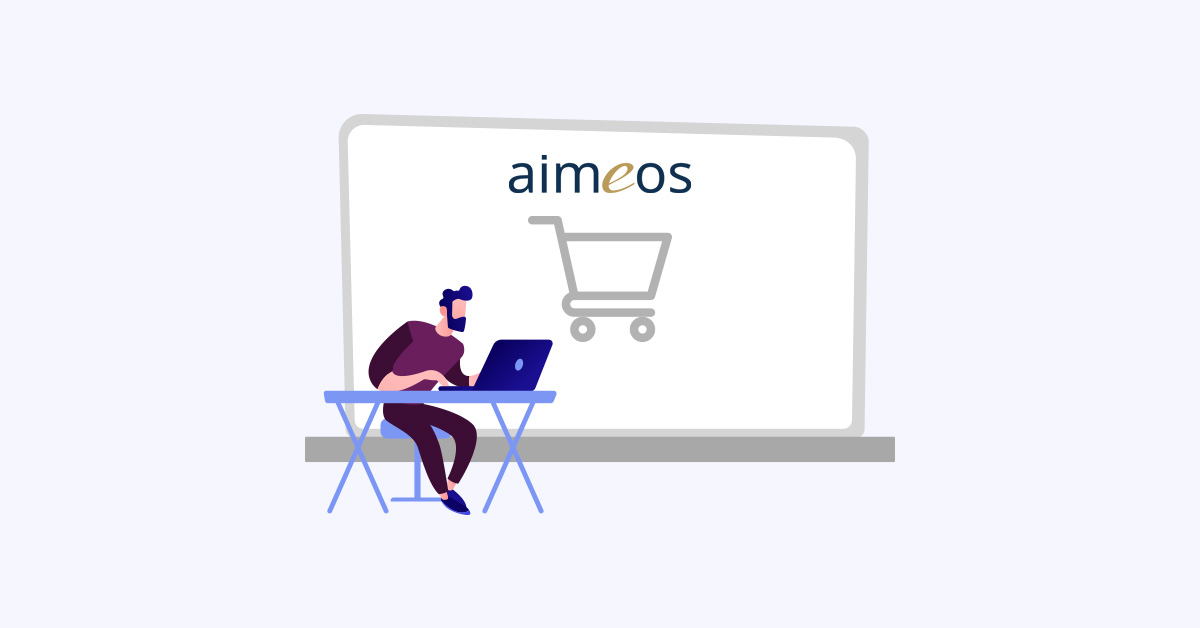
Aimeos tops the list of most widely used Laravel packages in many ways. It not only contains all the required features to build a fully functional eCommerce store but also gains additional functions such as customizable themes, multilingual support as well as SEO-specific tools to maintain search engine rankings.
Aimeos package is absolutely free of cost and offers blazing fast web speed when combined with an efficient database system and optimized server. Since the package is known for zero speed delay, it is backed up by a vast community of Laravel developers. One can extend, adapt, overwrite and customize anything with Aimeos.
2. Bagisto
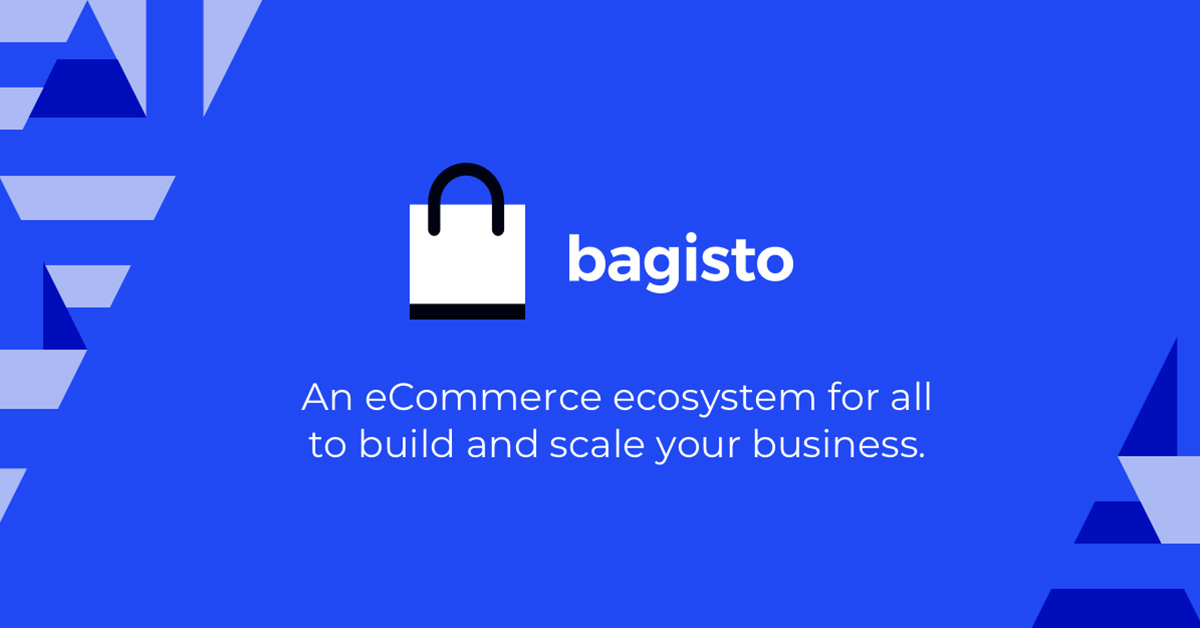
Bagisto is a hand-tailored Laravel eCommerce package built using vue.js. It is developed keeping accessibility in mind, hence, specified for all levels of users, to help them scale their business. This package lets you take complete control over your site and offers varied functionalities that bring engagement.
Being powered by Laravel, Bagisto allows easy product management. This means that you have the freedom to launch your products or services as per the market demands. It is utterly flexible and convenient to use, even if you are a little low on technical ground. The Laravel eCommerce websites built using Bagisto consume less time, resources, and cost since it is an open-source package.
In case Bagisto interests you for your eCommerce project, here’s a video on how this Laravel package can benefit your project.
Video source: Get-set Bagisto for eCommerce
3. Mage 2
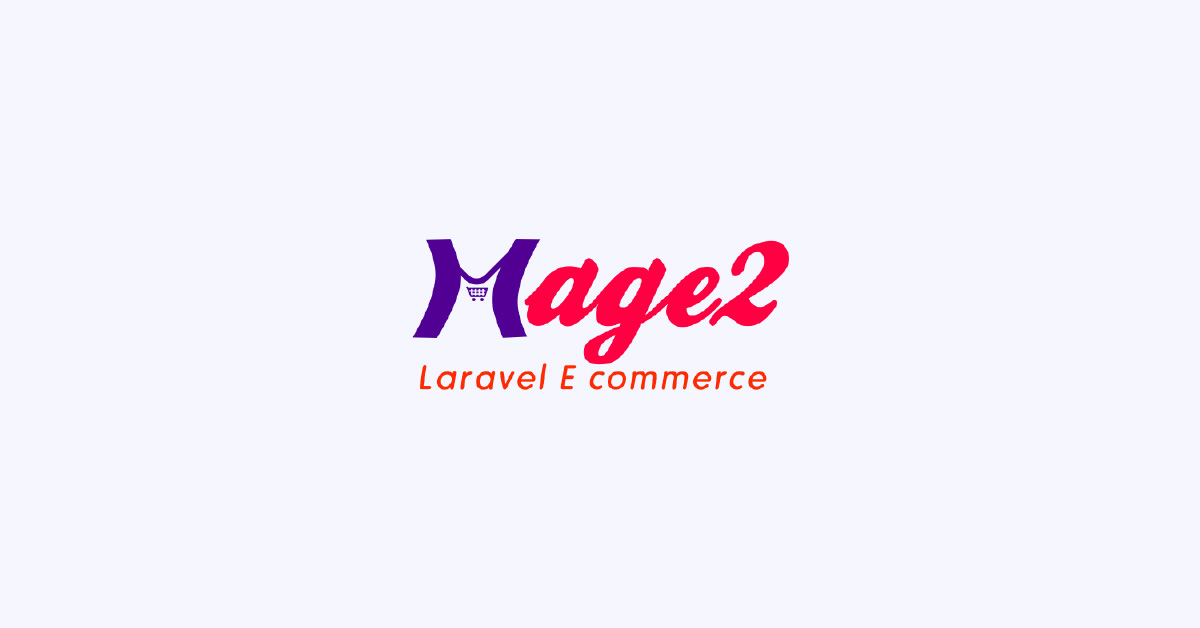
Mage 2 is another well-known Laravel eCommerce package that gives you a regulated set of modules. However, its usage in web development is quite different. While other packages require singular installation, with Mage 2, you can download snippets of code for various functionalities. Further, these code snippets can be integrated with the core code of the application or the website so that the base code remains intact.
The most fascinating benefit of working with Mage 2 is that it lets you pick the features according to your preference. On top of that, you can also customize the code snippers; however you want for your store.
Limitations of CMS Shopping Cart Software Solutions
Restriction by CMS and plugins
Popular and most used CMS platforms were initially developed to cater to specific needs of the web, including social networking, blogging, online brand management, etc. However, if you expect extra features such as inventory management, shopping carts, payment gateways, and delivery services, you might need to integrate third-party extensions in your app/site. Therefore, CMS poses certain restrictions when it comes to eCommerce functions.
Monolithic Architecture
Another drawback of using readymade eCommerce CMS is that the applications or websites become page-centric. They might seem hassle-free at first, but their components are hard to update independently. As a long-term result, when your consumer base grows, the site either performs poorly or fails to load.
It is better to develop an online store that is more likely made on service-oriented architecture like Laravel.
Final Analysis
This article has tried resolving the common eCommerce dilemma of choosing Laravel eCommerce package or ready-made CMS platforms for your online store. Although Laravel serves us with more benefits, the choice also majorly depends on the requirements of your eCommerce store. Either way, you must consider a platform that fulfills all your business requirements.
